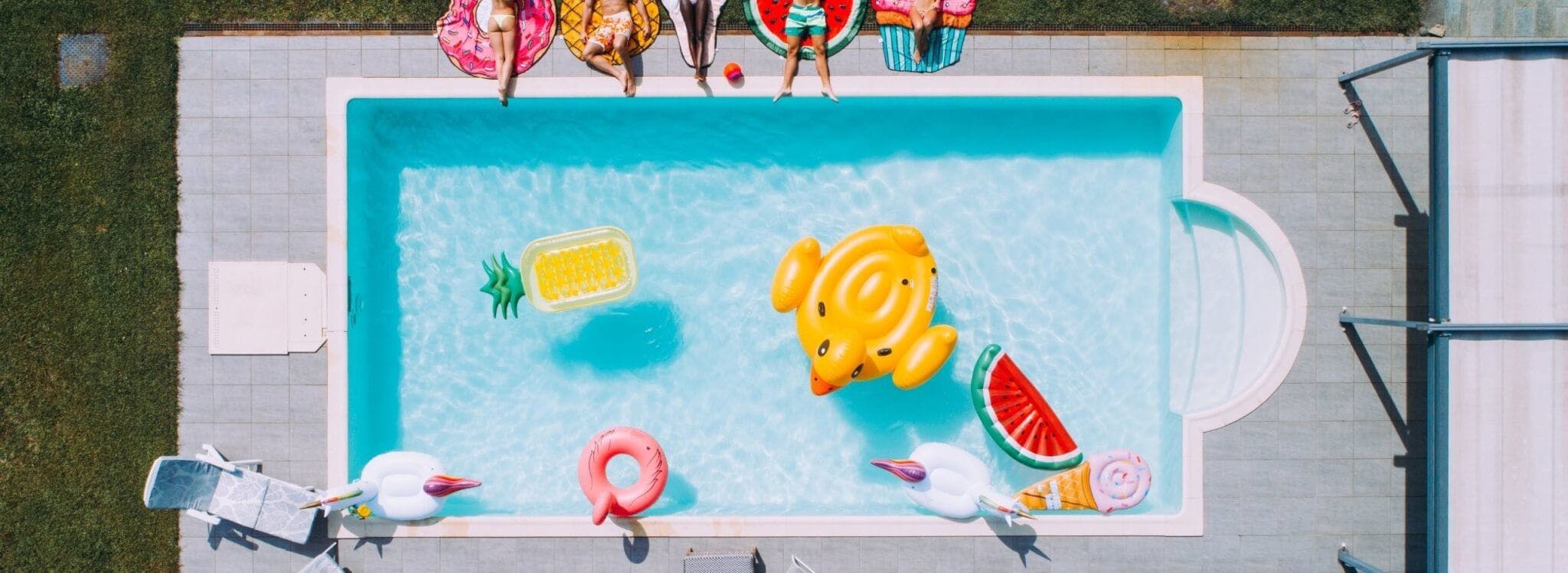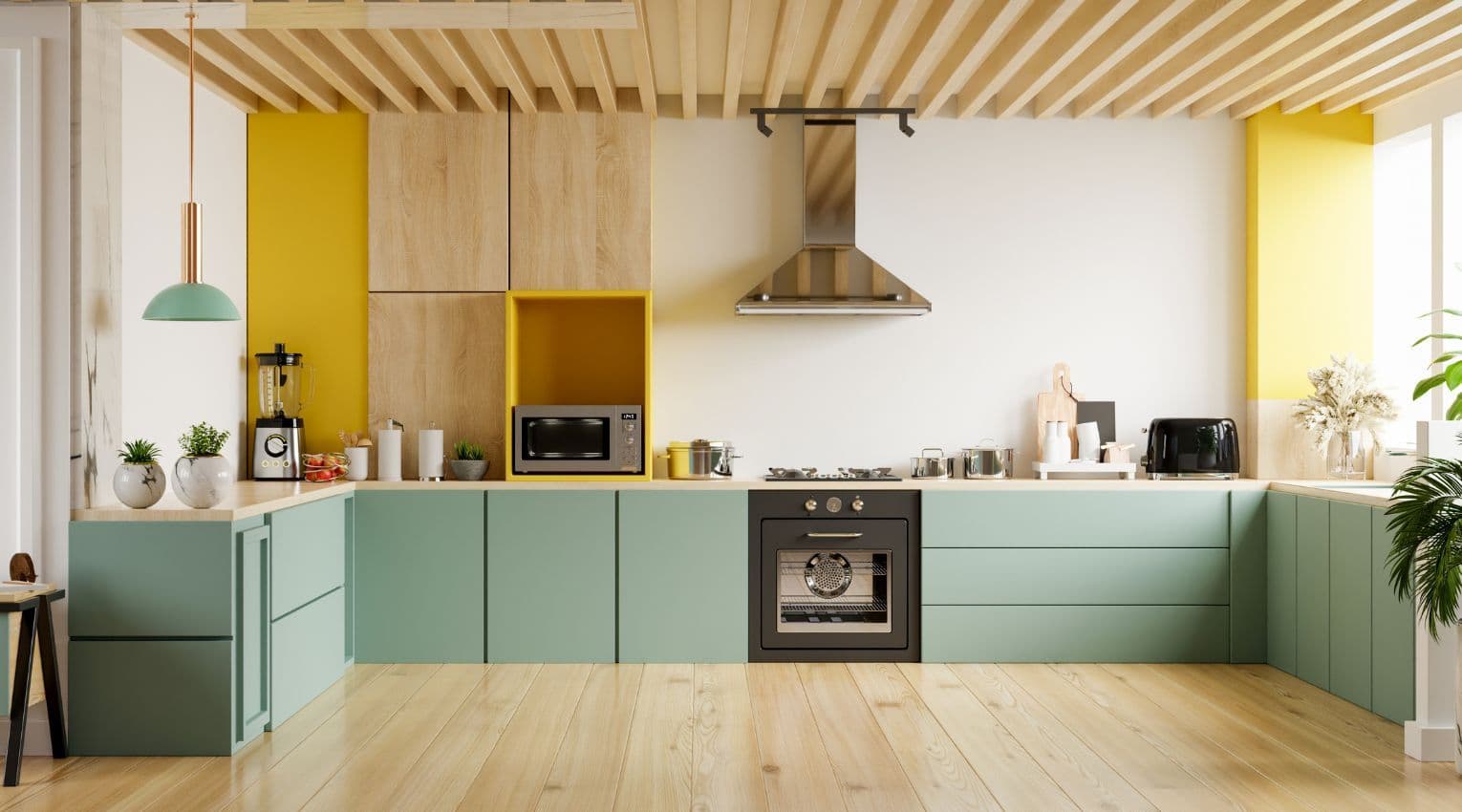What Homeowners Need to Know About Pool Financing

Last updated January 30, 2025
You can throw supply-and-demand-logic out the window when it comes to above- and in-ground pool costs. While the COVID-19 pandemic in 2020 led to a brief boom in pool installations, new pool construction has decreased an estimated 15 to 20% year-over-year in 2024. At the same time, pool costs have continued to climb despite decreasing demand, from an average of $40,000 to $65,000.
Still, a pool can be both a great long-term investment and a great place for you to make memories with your family, and there are a variety of ways to fund one. There are several things to keep in mind before you take the plunge, including the issue of affordability, whether you’re looking for above-ground or in-ground pool financing or loans for pool installation. Learn about your options for pools, pool loans, and alternative ways to fund a pool below.
Kinds of Swimming Pools
Before you can crunch the numbers on costs, you’ll need to decide what kind of pool you want: saltwater or freshwater, above- or in-ground. Both freshwater and saltwater use the same general equipment and, despite what their names might suggest, both require chlorine. However, a saltwater pool can be more expensive to install, but its chlorine is generated through a system that breaks down salt, which is quite inexpensive. Freshwater pools require chlorine tablets or chemicals to be added to the water on a regular basis, making them pricier in the long term. So as long as you opt for an energy-efficient system for your saltwater pool, that tends to be the more economical choice.
How Much Is It to Finance a Pool?
The difference between above-ground and in-ground pool financing is a bit more clear-cut. According to HomeGuide, the average cost of an in-ground pool ranges from $25,000 to $100,000, with the typical installation coming in at $65,000. Above-ground swimming pool prices are much lower: professional installations can cost anywhere from $1,600 to $7,500, with the standard around $4,500. With the addition of a deck and stairs, the price tag can increase to around $17,000. If you opt to build the pool yourself, you’ll save even more; the typical kit is just $1,100—$2,600. However, this approach leaves much more room for error, so it’s almost always a good decision to spend the extra money on a professional who makes sure everything is hooked up correctly — and may help you avoid expensive issues down the road due to do-it-yourself mistakes.
There’s also the consideration of timing. You can actually save money by having a pool installed in the fall given the reduced demand. This can be a wise move from a practical perspective as well, since the process can take up to six months to complete. If you wait to start until the spring, it may not be finished in time to enjoy it for the summer!
Additional In-Ground and Above-Ground Pool Financing Considerations
Putting in a pool will have an impact on your homeowners insurance, since it adds an extra level of liability in the event that a guest is injured. While many of the potential hazards may be covered by your existing policy, it’s a good idea to inform your insurance agent in case they can increase your coverage.
Of course, needs like landscaping, fencing (required in most states), building permits, electric work for pumps and filters, and continual maintenance will add even more costs beyond the installation and insurance. You can expect basic annual upkeep, plus expected repair and utility costs, to run about $3,000 to $6,000. And while a pool can add value to your home, it may not be as much as you think: according to Houselogic, it adds a maximum of 7%, and not all buyers will see a pool as an advantage.
See the chart below for a quick comparison of total annual in-ground versus above-ground pool costs.
Average Pool Installation Costs

Financing a Pool Installation
There’s much more to a pool installation than meets the eye, and the last thing you want is to find yourself in the financial deep end. Fortunately, when it comes to pool financing, you have options, including taking out a loan to build a pool. Here are some of the most common choices for pool installation loans:
Personal or home equity loan:
What it is:
A loan backed by a financial institution that allows you to either borrow money or access it from your home equity to fund a pool.
Pros:
- Lump sum of cash
- Fixed interest rate and predictable monthly payments
Cons:
- Monthly payment in addition to mortgage
- Potentially restrictive application criteria and lengthy application process
Home equity line of credit (HELOC):
What it is:
A line of credit that gives you on-demand access to cash from your home equity whenever you need it, up to a maximum amount.
Pros:
- Flexibility to pull cash whenever you need it
- No interest due unless you take out money (paying interest only on the amount you’ve drawn)
Cons:
- Variable interest rates can lead to unpredictable monthly payments
- Lender can freeze your HELOC at any time if your credit score or home value drops
Cash-out refinance
What it is:
A new mortgage with a higher balance than your original one that gives you the difference in cash.
Pros:
- Lump sum of cash
- Potential to secure a lower mortgage rate
Cons:
- Resetting mortgage often means extending your mortgage timeline
- Additional mortgage fees like application and closing costs
Home equity investment
What it is:
A solution that gives you cash in exchange for a percentage of your home’s future value.
Pros:
- Lump sum of cash
- No monthly payments or added debt
Cons:
- Investment must be settled within 10 years through a buyout with savings, refinance, or home sale
- Minimum of 25% equity in home required
Frequently-Asked Questions
How do you finance an above-ground pool?
There are multiple ways to finance an above-ground pool, including a personal or home equity loan, home equity line of credit (HELOC), cash-out refinance, and home equity investment. The best option for you all depends on your personal financial situation and the specific features of the pool you want to install.
What is the minimum credit score for pool financing?
Qualification criteria varies by both financing option and by company or lender. In general, most personal loan providers require a minimum score of 580, and that number is typically even higher for home equity loans, ranging from around 620–680. Some home equity investors, like Hometap, have a minimum requirement of 500, though most homeowners we work with have a score of 600+.
How do most people finance pools?
Some of the most common pool financing options are loans, like personal or home equity loans, which provide cash in a lump sum, or home equity lines of credit (HELOCs), which give homeowners access to cash as needed to fund the pool.
Others opt for cash-out refinances, which replace their current mortgage with one that carries a larger balance and gives them the difference, or home equity investments, that provide funding from their home equity without the burden of monthly payments or added debt.
What are typical pool financing terms?
The length of pool financing terms is also something that varies by company. For both loans and home equity investments, terms typically range from 5 to 30 years. A Hometap Investment has a 10-year term.
How much is it monthly to finance a pool?
The monthly cost to finance a pool depends on multiple factors, including your chosen method (loan, HELOC, refinance, or home equity investment) and the total cost of your pool installation. Our debt calculator can help you visualize how long it could take you to pay off your choice of pool financing, once you know your total, interest, and monthly payment.
How much does an above-ground pool cost per year?
While it depends on your pool materials and its size, the average annual cost of total upkeep is $3,000 to $6,000, which includes maintenance, repairs, electricity, and water.
Are above-ground pools a good investment?
While pools in general don’t typically add much value to your home — only an estimated 7% — an above-ground pool comes with a significantly lower price tag than an in-ground pool, so depending on your planned use, it might be worth the cost for your family.
Can you add a pool into a mortgage?
Yes, you can typically roll your pool financing into your mortgage by taking a cash-out refinance, which replaces your existing mortgage with a new one that carries a larger balance. When you take a cash-out refinance, you should be able to include the cost of your pool in the new mortgage.
The more you know about your home equity, the better decisions you can make about what to do with it. Do you know how much equity you have in your home? The Home Equity Dashboard makes it easy to find out.
You should know
We do our best to make sure that the information in this post is as accurate as possible as of the date it is published, but things change quickly sometimes. Hometap does not endorse or monitor any linked websites. Individual situations differ, so consult your own finance, tax or legal professional to determine what makes sense for you.



